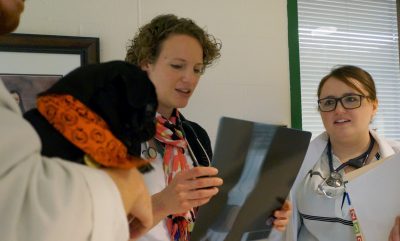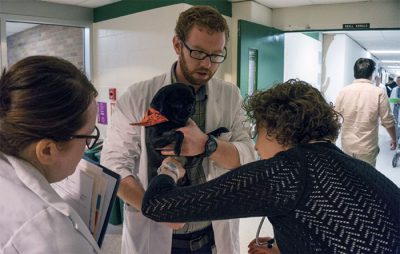Like many in the profession, Laura Nelson always knew growing up that she wanted to be a veterinarian. She knew it would be a tremendous amount of hard work and also that gaining admission to veterinary school would be difficult. Because of her love for education and Biology, in addition to veterinary medicine, Nelson's back-up plan was to teach biology.
"I always liked education," says Nelson, DVM, MS, DACVS, an assistant professor of small animal surgery. "Once I started vet school, I was always at a teaching hospital, and I always enjoyed working with students."

In fact, her love for education and teaching is what steered her toward academia as opposed to private practice, which draws most specialty trained veterinarians.
Now her commitment to teaching and her skill as a veterinarian have earned her the prestigious Lilly Teaching Fellowship. The Lilly Teaching Fellows Program is designed to provide pre-tenure faculty with the opportunity to enhance their teaching skills through the study of pedagogical scholarship and their own research. She is one of just six faculty members from across the university to receive the year-long award.
Fellows, selected after a rigorous application process, spend approximately 10 hours a month reading and discussing scholarship on teaching, and complete various exercises intended to integrate what they're learning into their own classrooms. They also must work with a mentor on a research project of a publishable caliber.
"The Lilly Fellowship is really a premier program that enables outstanding teacher/scholars to study what the latest education scholarship has to tell us, and to focus on a genuine problem they identify that will move their field forward," says Deborah DeZure, assistant provost for faculty and organizational development, designer and facilitator of the program.
Nelson hopes to apply the educational theories and knowledge she acquires as a fellow directly onto the clinic floor with students. "A lot of veterinary medicine education is very late to pedagogy," she says. "Advanced education for those who eventually teach at veterinary colleges is focused on training, skill enhancement, and research, not on the "how to's" of teaching."

"I think a lot of what I've done well in education to this point is just showing up every day and being compassionate and helping students through," Nelson says. "It's not informed by any educational theory. As a resident, there's no mandatory training on how to teach as a junior faculty member." Professor P. S. MohanKumar, Nelson's mentor for her fellowship research and himself a former Lilly fellow, agrees.
"People get their PhD and we ask them to teach, regardless of whether they have expertise in teaching," he says. "Most of us do a pretty good job. Some of us are known for good teaching, but you don't know why. With the Lilly Fellowship, you get the vocabulary in terms of why you are a good teacher, what is the scholarship of teaching and learning, how do you teach to diverse learners, how do you assess teaching, how do you assess learning?"
The question of how to effectively assess veterinary students in their clinical rotations will be the focus of Nelson's research project. She will examine anonymous student data from the last several years and see whether their pre-clinical and clinical grades align. She plans to analyze the data for trends based on age, race, ethnicity, and gender; if some groups' grades tend to drop during clinics, she'd like to find out why and propose solutions.
"Laura's project is taking on a complex set of issues; it's a significant challenge," DeZure says. "The findings will be of interest to veterinary faculty across the United States and will have interest for teachers in other clinical fields. She really is going to be making a major contribution."
"In my clinical teaching, the thing that's frustrated me is how to give effective feedback," she says. "Students get a letter grade on their rotations, but they're not taking tests, so there's no objective measurement of how they did; grades are based on our observations of how they did. You think with science and medicine that it's black and white, but people are not as logical as you want them to be. There are lots of tricks and biases that aren't obvious to us in the evaluation process."
Many veterinary students are women and many have naturally reticent personalities, Nelson notes. They may be less likely to speak up around their more verbose colleagues or unless they feel sure they know an answer.
"Students may only speak when they're sure they know the answer. We might not realize how much they know," she says. "One of the reasons people may not go into surgery is because they're not encouraged to. If professors don't pick up on the right cues, some people who could do that job aren't going to go on and do it."
Part of the Lilly Fellowship's purpose is to empower fellows to share what they've learned, both in their research and through their study of pedagogical scholarship, with their colleagues. MSU has 140 current and former fellows, over the 23-year history of the program, who are "deeply trained in teaching and learning," DeZure says. "That's already a critical mass to really influence teaching and learning at MSU."
"There's so much educational theory that would benefit our students and potentially save effort in the long run," Nelson says. "My goal is to find people who have potential to be leaders in their areas and give them information about education theory and hope they'll use it to raise the standards overall."
Posted: September 2014
